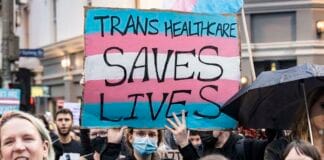Part of the deal Malcolm Turnbull struck to take Tony Abbott’s job was promising to stick with his plan for a plebiscite on same-sex marriage after the next election. Six months on, the government is yet to discuss a formal proposal for how to run the popular ballot or how to change the law. Attorney-General George Brandis says the details will emerge “in the coming months”.
As it stands, parliament would still have to pass legislation after a plebiscite to actually make equal marriage law. Turnbull has said that, should the plebiscite succeed, he would expect his MPs to wave the change through parliament.
But Coalition MPs Eric Abetz, Cory Bernardi and Bridget McKenzie declared in February that they could still vote against equal marriage even if the public voted in its support—demonstrating what a farce the process is.
The plan for a popular vote serves the same purpose for Turnbull as it did for Abbott—delaying the issue as long as possible. Turnbull’s prime concern now is not introducing equal marriage but finding a way to keep the homophobes in the Coalition contented. Doing otherwise risks his position as leader.
If he had any principles, Turnbull would simply bring on a parliamentary vote. In late January Rodney Croome of Australian Marriage Equality told the media, “We’re confident the numbers are there for marriage equality to pass both houses of federal Parliament right now if a free vote is granted to Coalition members.”
It’s already clear from opinion polls that an overwhelmingly majority of the population support marriage equality, as many as 68 per cent, according to a Fairfax poll last year. Turnbull’s Facebook declaration of his love for wife Lucy on Valentine’s Day was met with a torrent of comments pointing out he’s denying others the same rights.
A plebiscite is nothing more than an expensive operation in stalling. There is simply no need for it.
However some supporters of equal marriage have argued against a plebiscite on the grounds that it would unleash a torrent of homophobia. Rodney Croome warned the process would be “divisive”.
There would surely be offensive campaigns against equal marriage. But the opponents of equal marriage, including a series of reactionary MPs who are constantly given a platform in the media, have been broadcasting homophobic nonsense for years in an effort to prevent equal marriage.
Any plebiscite would demonstrate again the overwhelming support for marriage rights. Ireland’s referendum for equal marriage won an inspiring victory and built support for equality in a country with a history of conservative attitudes to sexuality.
By James Supple




